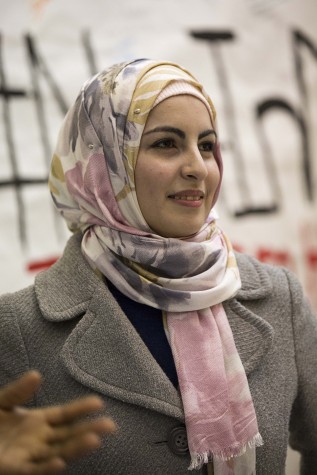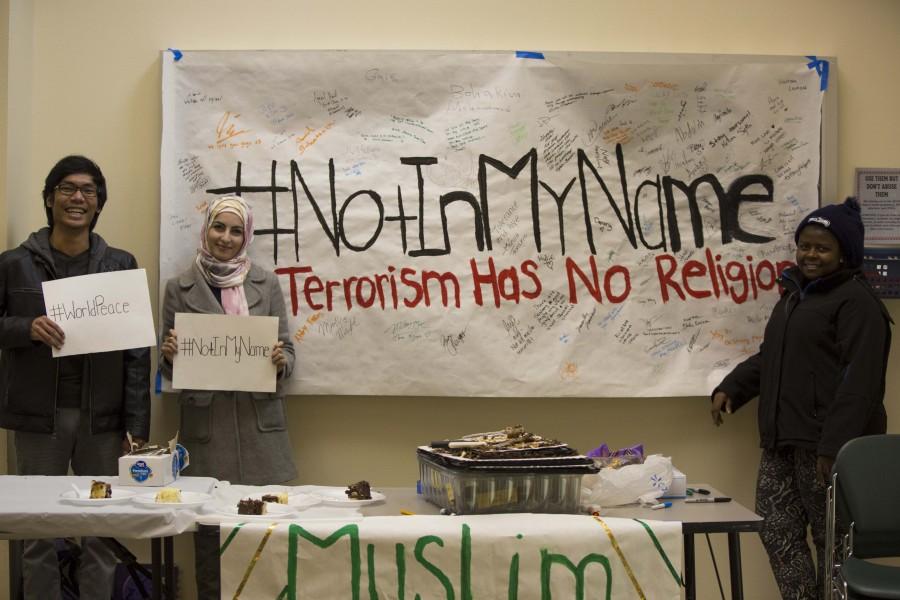The Muslim Student Association promoting tolerance and knowledge. From left: Syahir Jami from Malaysia, Esra Alameedi from Iraq, and Sufayatu Issaka from Ghana.
What’s Your Story: Race
February 16, 2016
You’re not from around here, are you?

Sheyma Yousif, Sufayatu Issaka, Esra Alameedi and Syahir Jamil were passing out cake in a corner of Parks Student Union. Issaka had a Seahawks beanie on, and Esra’s face was partially covered by a hijab. Behind them was a giant paper banner that read, “#Notinmyname.” The reason this protest was being held can be summarized with one thought: “How is it, that they are fighting themselves?”
Issaka told me a story of how she was sitting in class and one of her fellow students could not understand how Muslims could possibly be fighting other Muslims. Issaka’s father left Nigeria before Boko Haram, an Islamic extremist group, rose to power. Yousif’s family ran from Saddam Hussein during the Halabja, when he was intent on wiping Kurdish people from existence, members of her family are currently fighting against ISIS.
When Alameedi was in middle school, someone told her to “go back to her own country.” She doesn’t want to go back to a place where “they will lock you up or they will kidnap you.” A place where “there is no freedom.” Issaka and Jamil find that they don’t typically face the blatant segregation their religion brings because of their dark skin, although they experience situations where their religion separates them from others.
Jamil who is from Malaysia, told me “two or three people will get on (the bus) wearing a hijab and the atmosphere in the bus suddenly changes. They kind of worry, like is this bus going to explode? I don’t know why, they are just wearing a hijab, and I can feel the tension.”
“Chinatown”
Stereotypes have a bit of truth to them, otherwise they would just fizzle out and die. The stereotype that there are a ton of Asian students who eat in the cafeteria, has a fair bit of truth to it. It isn’t an attack on anybody, everyone has to eat. Perhaps it provides a certain sense of community for those who feel as if they have none.
T.J. Cha is extremely outgoing, knows how to twerk and is a first generation Hmong. His dad told him that his name stands for Thomas Jefferson, but he figured that name was too white, so he asked his mom. His mom said that it didn’t stand for anything, it is just T.J. and sure enough, that is what is written on his birth certificate. Some days he might be Tyrone James, or maybe Tyson Jones. For someone so lighthearted, it is hard to tell that he is of a group of people who have suffered for hundreds of years.
The Hmong people were chased out of China during the Ming and Qing dynasties, and T.J. would like you to know that “for the record we aren’t all gangsters” as portrayed in the movie “Gran Torino.” After the exile from China, most Hmong people fled to Laos and Siam (Thailand.) During the Vietnam war, they sided with the American GI’s and were once again, pushed from their homes. Both of T.J.’s parents separately fled from Laos to Thailand and from there to California, where they met one another.
T.J. went to high school in Snohomish where he was, “The one Asian dude who breakdances and stuff.” When he came to Everett, it was an eye opening experience, “I was accustomed to only seeing white people and now I see Asians, and blacks, and Mexican people, and I’m like, this is cool! Like a present, and you weren’t expecting it.”
Across the table from T.J. sat Hiu Ching Lee. She was born in China, in a small town. But small town China was completely different from small town Wisconsin, where she first arrived on a student visa. “Cheese,” Lee told me, “Cheese, cheese, and cows!” She rode her first horse, and cleaned her first cow barn, the former being the happier experience. Lee was the only exchange student in Wisconsin, and for the first three months she really struggled with English and had no one to speak with in her native tongue. After becoming a cheerleader for her school in Wisconsin, things got easier but also much colder as it was always snowing. She feels less stressed at EvCC, and spends lots of time with other international students.
Financial aid and personal space
Eduardo Mendoza and Suyesh Singhel were eating vanilla pudding together in the Diversity and Equity Center. Compared to his studies back home in India Singhel feels no pressure from his impressive 21 credits, whereas Eduardo is stressed about being able to pay for school.
Eduardo’s family moved here from Mexico and gained citizenship in the late 80’s. They think college is a waste of time and want him to leave school so that he can work in construction and find a wife. The story of his grandfather working with his hands to bring the family to America hangs over his head.
Singhel is the 14th engineer in his family, he is from an area in New Delhi where people are business orientated but his family has broken the mold by pursuing professional education.
Singhel just learned what personal space is and finds it comical. “Living in India,” he says “it is such a crowded country that people don’t really think of these things.” He thinks people in America are friendlier than in India, but that there are no decent options for a strict vegetarian here.

